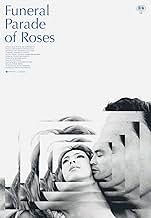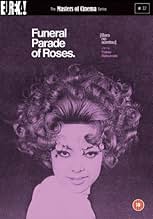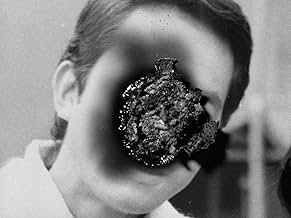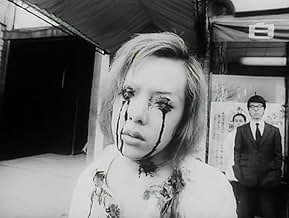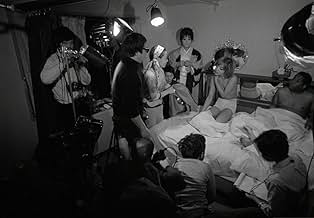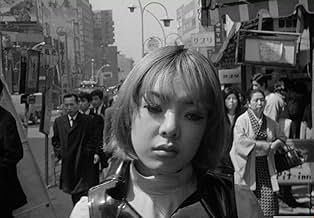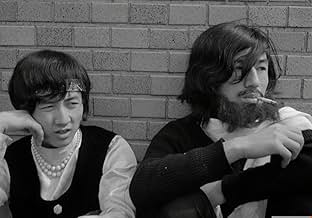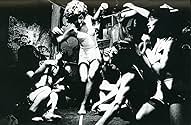VALUTAZIONE IMDb
7,7/10
7914
LA TUA VALUTAZIONE
Le prove e le tribolazioni di Eddie e altri travestiti in Giappone.Le prove e le tribolazioni di Eddie e altri travestiti in Giappone.Le prove e le tribolazioni di Eddie e altri travestiti in Giappone.
- Regia
- Sceneggiatura
- Star
Recensioni in evidenza
10NateManD
"Funeral Parade of Roses" is an underrated unknown work of Japanese gay cinema. It was one of Stanly Kubric's favorite films, and it had a significant influence on the the style of "A Clockwork Orange". The film deals with Japanese drag queens, including the clubs, rivalry and their sex lives. In an Oedipus fashion, except reversed, the main character kills his mother so he can have relations with his father. Director Toshio Matsumato seemed to be way ahead of his time for his portrayal of sexuality and violence on screen. Also in a Bergman like fashion, actors are interviewed so the audience realizes it's only a movie.(and a twisted one at that) The film has many hallucinatory scenes, and who could forget the drag queens using urinals. There's also a weird fight scene between the two drag queens, and when they yell comic bubbles pop out of their mouths. Thank God this movie is in black & white! It's very brutal, disturbing and violent at times; so watch with caution. "Funeral Parade of Roses", is simply shocking and brilliant!
In a key moment around the half-way mark in Toshio Matsumoto's Funeral Parade of Roses, the young protagonist Eddie, a transsexual working in Tokyo, stabs his mother's lover and then his mother himself. Matsumoto's film is full of Oedipal subtexts, but here Eddie kills his mother to (perhaps) get to his father, so it is the reverse of the Oedipus story. In fact, most of the film is 'backwards' in the traditional sense, full of narrative tricks, contrasting styles and shifts in tone, moving from melodrama to documentary to horror with each scene.
Eddie (played by real-life queen Pita) is a drag-queen working at a top Tokyo underground club ran by Gonda (Yoshio Tsuchiya). Eddie is the top attraction at the club, much to the envy of ageing madam Leda (Osamu Ogasawara). When Gonda starts a secret affair with Eddie, Leda finds out and plans to hurt and disfigure Eddie in her jealousy. Running alongside this fictional storyline are various interviews with the real-life queens who act in the film, who offer insights about life in Tokyo for queens and how the film will represent them.
There was a huge boom in Japan in the 1960's of films now known as Japanese New Wave. Funeral Parade of Roses is certainly one of the most daring and technically innovative, stripping back genre (and even cinematic) conventions to create one of the most important films in the history of Gay Cinema. This leads to an occasionally confusing and head- spinning film, that can switch quickly from a generic love scene to a moment of avant-garde (an argument between two queens have them shouting at each other with speech bubbles) to a bloody set-piece. One of the most inspirational films to come out of Japan, this was a favourite of Stanley Kubrick's, and no doubt the scenes that are played out in fast- forward were an influence on A Clockwork Orange (1971). Uncompromising, unapologetic cinema.
www.the-wrath-of-blog.blogspot.com
Eddie (played by real-life queen Pita) is a drag-queen working at a top Tokyo underground club ran by Gonda (Yoshio Tsuchiya). Eddie is the top attraction at the club, much to the envy of ageing madam Leda (Osamu Ogasawara). When Gonda starts a secret affair with Eddie, Leda finds out and plans to hurt and disfigure Eddie in her jealousy. Running alongside this fictional storyline are various interviews with the real-life queens who act in the film, who offer insights about life in Tokyo for queens and how the film will represent them.
There was a huge boom in Japan in the 1960's of films now known as Japanese New Wave. Funeral Parade of Roses is certainly one of the most daring and technically innovative, stripping back genre (and even cinematic) conventions to create one of the most important films in the history of Gay Cinema. This leads to an occasionally confusing and head- spinning film, that can switch quickly from a generic love scene to a moment of avant-garde (an argument between two queens have them shouting at each other with speech bubbles) to a bloody set-piece. One of the most inspirational films to come out of Japan, this was a favourite of Stanley Kubrick's, and no doubt the scenes that are played out in fast- forward were an influence on A Clockwork Orange (1971). Uncompromising, unapologetic cinema.
www.the-wrath-of-blog.blogspot.com
An unsettling and astonishing Japanese film that introduced me to the Japanese New Wave movement.
"Funeral Parade of Roses," like many of the best works of art, defies description or categorization. It dives into the Japanese gay sub-culture of the 1960s, and specifically young gay men who dress and act like women. It blurs the line between fact and fiction; at times, the actors in the movie become actors in a movie within the movie, and the movie itself becomes a documentary about the making of a movie about gay Japanese youths. If you can follow that sentence, then you're on the way to having the right sensibility to enjoy this film.
It's a shocking movie too, going places most other films at the time, and certainly few American movies, would dare. The only big American movie I can think of from that time period that comes even close to tackling subjects that general audiences would find equally unsavory is "Midnight Cowboy," and this film makes that one look like a Doris Day romp in comparison.
Grade: A
"Funeral Parade of Roses," like many of the best works of art, defies description or categorization. It dives into the Japanese gay sub-culture of the 1960s, and specifically young gay men who dress and act like women. It blurs the line between fact and fiction; at times, the actors in the movie become actors in a movie within the movie, and the movie itself becomes a documentary about the making of a movie about gay Japanese youths. If you can follow that sentence, then you're on the way to having the right sensibility to enjoy this film.
It's a shocking movie too, going places most other films at the time, and certainly few American movies, would dare. The only big American movie I can think of from that time period that comes even close to tackling subjects that general audiences would find equally unsavory is "Midnight Cowboy," and this film makes that one look like a Doris Day romp in comparison.
Grade: A
If you really are looking for a good time in a movie theatre - watch this movie ! It has been said that some of Kubrick's visual and sonic ideas for "Clockwork Orange" were inspired by this movie; after having seen it, i'm more than convinced that this is true.
This movie offers a lot of cinematic ideas and it uses surprising ways to make a point within a story.
What is the reason that films with a spirit and mood like that have vanished from the screen ? Have the politics in the movie industry really become so strict ? This movie watched nowadays has (but maybe had always) a subversive feel to it, why is that ?
It definitely offers something different and therefore would be very welcome in movie theatres and videostores around the world to free us from all the uninspired formula movies.
This movie offers a lot of cinematic ideas and it uses surprising ways to make a point within a story.
What is the reason that films with a spirit and mood like that have vanished from the screen ? Have the politics in the movie industry really become so strict ? This movie watched nowadays has (but maybe had always) a subversive feel to it, why is that ?
It definitely offers something different and therefore would be very welcome in movie theatres and videostores around the world to free us from all the uninspired formula movies.
I am not a fan of avent-garde films, which I find are often pretentious and silly, but I enjoyed "Funeral Parade of Roses", primarily because I found the main character "Eddie" (played by Shinnosuke Ikehata aka "Peter") fascinating. The film is a non-linear composite of drama and documentary like vérité punctuated by abstract inclusions (jump cuts to stills, substitution splices, etc), some of which are more effective than others. Supposedly, Kubrick drew inspiration for "A Clockwork Orange" (1971) from this film and there are certainly some similarities (at one point Eddie looks straight at the camera through up cast eyes in a scene that reminded me of the iconic opening shot of "Alex" in Kubrick's film). Lacking much of a plot, "Funeral Parade of Roses" primarily peers into Tokyo's gay scene and follows Eddie, a transvestite 'bar girl' as he moves amoungst his friends (including pretentious auteur 'Guevara') in hopes of luring boss Gonda (Yoshio Tsuchiya) from rival, and bar 'Madame', Leda (Osamu Ogasawara), perhaps becoming 'Madame' himself. The black-and white cinematography is lovely, the characters intriguing and photogenic and the direction, for the most part, excellent (the interminable toking scene not withstanding). While the film is nonlinear, there is a traditional 'climactic' sequence at the end that is well worth waiting for and explains many of the references to the film being an Oedipal myth. Not to everybody's tastes but well worth trying out.
Lo sapevi?
- QuizIl funerale delle rose (1969) gave Stanley Kubrick several visual and aural inspirations for his adaptation of Arancia meccanica (1971).
- BlooperTutte le opzioni contengono spoiler
- ConnessioniEdited from Ecstasis (1969)
- Colonne sonoreO du lieber Augustin
I più visti
Accedi per valutare e creare un elenco di titoli salvati per ottenere consigli personalizzati
- How long is Funeral Parade of Roses?Powered by Alexa
Dettagli
Botteghino
- Lordo in tutto il mondo
- 1114 USD
- Tempo di esecuzione1 ora 45 minuti
- Colore
- Mix di suoni
- Proporzioni
- 1.37 : 1
Contribuisci a questa pagina
Suggerisci una modifica o aggiungi i contenuti mancanti

Divario superiore
By what name was Il funerale delle rose (1969) officially released in India in English?
Rispondi

